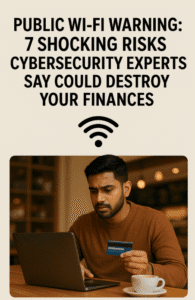Public Wi-Fi Warning: 7 Shocking Risks Cybersecurity Experts Say Could Destroy Your Finances
Imagine relaxing at a café and unknowingly exposing your bank details to hackers via public Wi-Fi—a risk India’s Computer Emergency Response Team (CERT-In) urgently warns against. Through its Jaagrookta Diwas campaign, CERT-In reveals how cybercriminals exploit unsecured public networks to eavesdrop, set up fake hotspots, and spread malware. With over 1.3 million cybersecurity incidents in India in 2023 alone, public Wi-Fi remains a hacker’s paradise due to weak encryption and man-in-the-middle attacks.
CERT-In advises avoiding financial transactions on public Wi-Fi, using VPNs, enabling two-factor authentication, and updating software regularly. If you’ve accessed sensitive accounts on public networks, immediately change passwords and monitor your finances closely. CERT-In’s efforts, part of India’s broader National Cyber Security Strategy 2023, aim to boost digital safety through public awareness. Ultimately, treating public Wi-Fi with extreme caution is critical to protecting your finances in today’s cyber-threat landscape.

Public Wi-Fi Warning: 7 Shocking Risks Cybersecurity Experts Say Could Destroy Your Finances
Imagine sipping a latte at your favorite café, casually checking your bank account over free Wi-Fi. Unbeknownst to you, a hacker across the room intercepts your login details, drains your savings, and vanishes. This nightmare scenario is exactly what India’s Computer Emergency Response Team (CERT-In) aims to prevent with its urgent warning against using public Wi-Fi for sensitive tasks.
The Hidden Dangers of “Free” Connectivity
Under its Jaagrookta Diwas (Awareness Day) campaign, CERT-In highlights how cybercriminals exploit public Wi-Fi’s lax security. These networks—common in airports, malls, and hotels—often lack encryption, allowing hackers to:
- Eavesdrop on data (emails, passwords, credit card numbers).
- Set up rogue hotspots with names like “Free Airport Wi-Fi” to trick users.
- Deploy malware through unsecured connections.
In 2023 alone, India reported over 1.3 million cybersecurity incidents, many tied to public network vulnerabilities. Yet, 62% of Indians admit to accessing financial accounts on public Wi-Fi, per a Norton Cybersecurity Report.
Why Public Wi-Fi Is a Cybercriminal’s Playground
- No Encryption: Most public networks don’t use WPA3 or VPNs, leaving data exposed.
- Man-in-the-Middle Attacks: Hackers position themselves between you and the connection point, capturing sensitive info.
- Session Hijacking: Criminals take over your browsing session to impersonate you on logged-in accounts.
How to Protect Yourself: CERT-In’s Expert Guidelines
- Avoid Financial Transactions: Save banking, shopping, or bill payments for secure, private networks.
- Use a VPN: Tools like ExpressVPN or NordVPN encrypt your data, masking activity from prying eyes.
- Enable Two-Factor Authentication (2FA): Adds a security layer beyond passwords—even if hackers get your login, they can’t bypass 2FA.
- Never Autofill Passwords: Disable this feature in browsers to prevent easy access to your accounts.
- Update Software Regularly: Patches fix security flaws—turn on automatic updates for OS and apps.
“But I Already Used Public Wi-Fi for Banking—What Now?”
- Immediately change passwords for financial accounts.
- Monitor statements for suspicious activity; report anomalies to your bank.
- Run antivirus scans to check for installed malware.
The Bigger Picture: India’s Fight Against Cybercrime
CERT-In’s advisory aligns with the National Cyber Security Strategy 2023, aiming to bolster India’s digital resilience. Initiatives like Jaagrookta Diwas educate citizens on evolving threats, from phishing scams to ransomware.
Public Wi-Fi is like a digital public restroom—convenient but best used with caution. As cyber threats grow, treating every open network as a potential risk could save your financial future.
You must be logged in to post a comment.